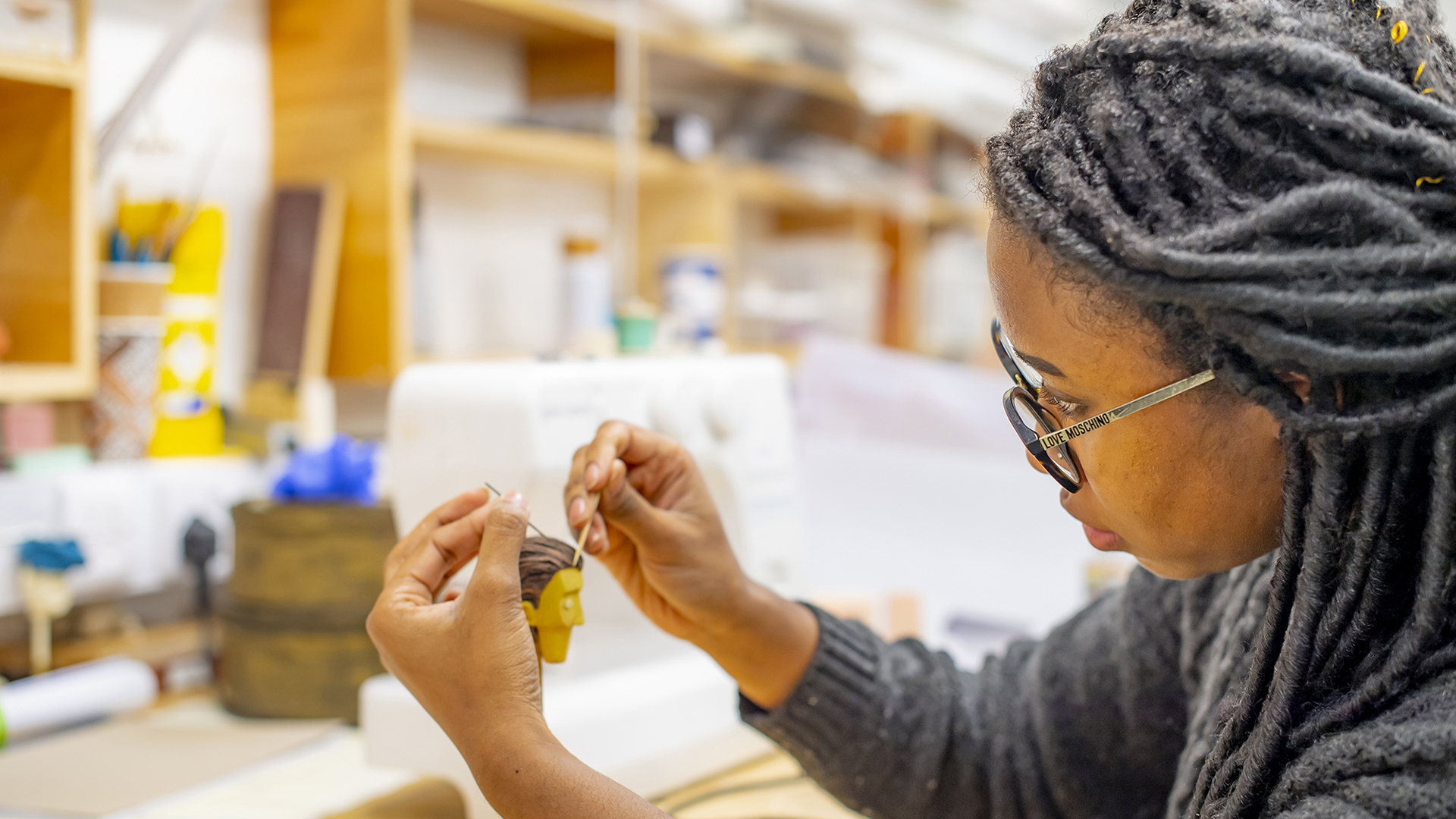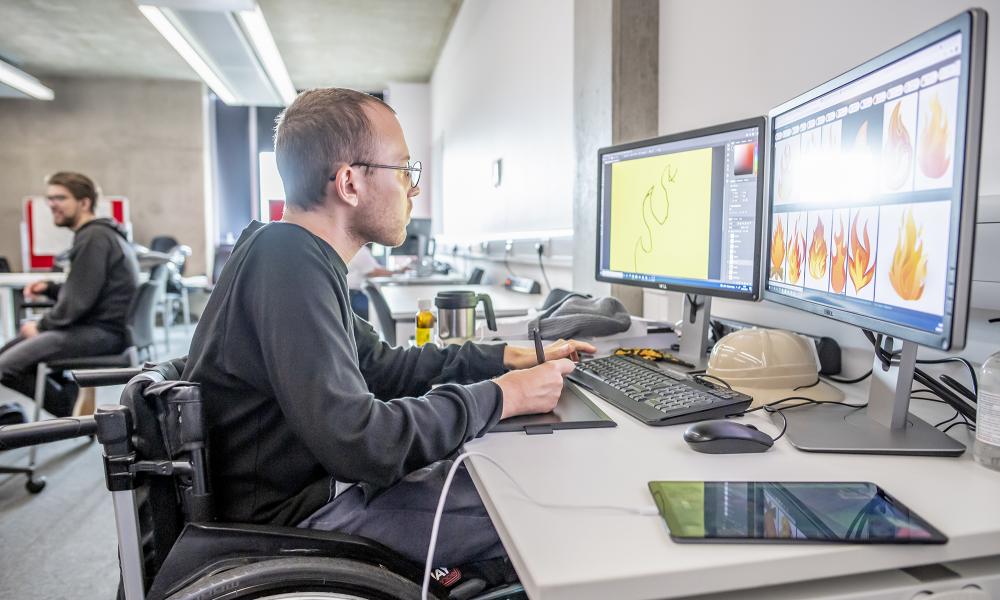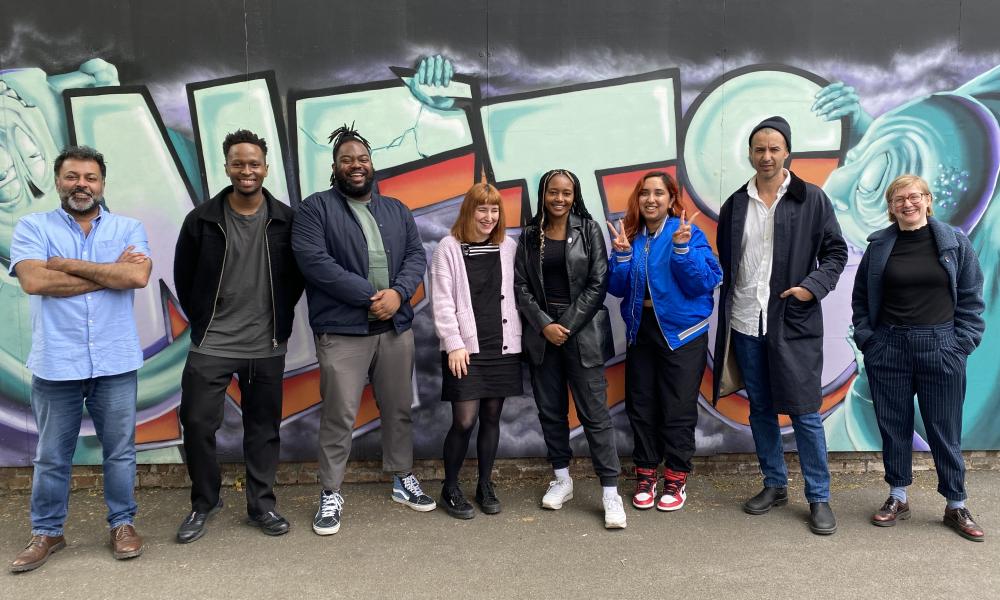Equality, Diversity and Inclusion
Equality, diversity and inclusion are at the heart of life at the National Film and Television School, and we are passionately committed to providing an environment that is free from discrimination, bullying, harassment or victimisation.
As a School with a global reach and outlook, we welcome students from across the world and are immensely proud of the many different ethnicities, identities, cultures and religions that make the NFTS a diverse and dynamic place to study.
We are passionately committed to providing an environment that is free from discrimination, bullying, harassment or victimisation. We foster a culture where everyone values difference, feels comfortable being themselves and has a real sense of belonging. We celebrate individuality, diversity and promote inclusion and equality of opportunity.
We recognise the importance of embracing a range of different ideas, histories, knowledge and culture and the strength that these bring to the quality of work and output of the School.
Increasing access and representation within the industry is something we are hugely passionate about at the National Film and Television School.
We welcomed our most diverse cohort of students yet in 2023 and with thriving bases in Glasgow, Cardiff and Leeds, we are committed to delivering our world class training across the UK and helping the screen industry become a place that better reflects the true diversity of contemporary Britain.
See below a few examples of our ever-developing diversity policies, programmes and initiatives.
Content Tabs
The NFTS supports staff and students with a wide range of disabilities. We aim to ensure the School is an inclusive place for disabled and neuro-divergent people and are working to increase representation of talented disabled professionals behind the camera at all levels.
The range of disabilities we support include but are not limited to:
- Specific learning differences (such as dyslexia, dyspraxia, ADHD)
- Mental health difficulties (such as depression, bipolar disorder)
- Long-term medical conditions (such as HIV, cancer, multiple sclerosis)
- Unseen disabilities (such as diabetes, asthma, epilepsy)
- Sensory impairments (such as blindness, hearing loss or deafness)
- Mobility or physical impairments (such as paralysis, arthritis)
As the NFTS continues its commitment in ensuring we are a diverse and inclusive community, we have consulted with a range of industry and sector stakeholders and commissioned industry expert Ally Castle to make recommendations for the distinct way in which we can play a deliberate, strategic role in supporting the greater inclusion of disabled talent within the film, games and television industries. In doing this, we recognise that the School, as the leading film, television and games school in the UK, can be effective in supporting disabled talent and be a catalyst for effective and meaningful change to issues faced by disabled talent within the industry.
As part of our commitment to delivering change in this area, we have developed an action plan of steps we will take to counter the physical, cultural and structural barriers faced by disabled creatives. We recognise that many of our commitments will be ongoing and we will review them on a regular basis to ensure we are making progress.
Read the full Disabled Talent Commitment (pdf)
Disabled Talent Commitment - Actions (pdf)
We are pleased to introduce a new purpose-built accommodation facility for students with physical access requirements, located at the heart of the school in Beaconsfield. This development forms part of our ongoing commitment to creating an inclusive, accessible environment in which all students can live and study independently and removes one of the biggest challenges of studying in Beaconsfield for disabled students.
These new rooms will be on the second floor of our new building, recently named the Cubby Building.
The building provides nine fully accessible rooms, designed to support a range of physical access requirements while enabling students to participate fully in NFTS life.
These rooms have been designed to put your needs first. Working with leading suppliers and equipment providers, we’ve created spaces that support the independence of our future students. From the moment you accept your place, we’ll work with you to ensure your living space meets your individual requirements.
Find out more, and read our questions and answers section on our Accessibile Accommodation page.
The NFTS has made a series of commitments underpinned by actions and, where appropriate, targets, with the aim of addressing the inequalities and disadvantages which many Black and ethnically diverse members of our community told us they regularly experienced. Many of these commitments are ongoing and we are continuously reviewing them to ensure we make the desired progress. We recognise that this is a journey and are working hard to end systemic racism. We are committed to being actively anti-racist across all areas of our work and we are determined that this work in progress will lead to long-term culture change at the NFTS.
- Download our Anti-Racism Commitment
- Download our Anti-Racism Actions
- Download our Equality, Diversity and Inclusion Strategy
- Download our Annual Equality Summary
As the NFTS continues its commitment in ensuring we are a diverse and inclusive community, we have appointed an external consultant to advise us on the development of a new Trans Policy, and as part of that met with students to discuss with them how the School can better support the Trans community.
As part of our commitment to delivering change in this area we have developed an action plan. We recognise that many of the actions we’re taking will be ongoing and we will review them on a regular basis to ensure we are making progress.
Download our Trans Awareness Action Plan
The Prime Video Directors Workshop is a ground-breaking 12-month course designed specifically to increase the number of people from under-represented groups working in screen directing. Taking the form of an intensive training course in narrative filmmaking, the six participants selected to take part will each create their own original short film during the workshop.
All3Media is one of the UK's largest independent television, film production and global distribution companies, and the official course partner for our TV Drama - Creating the Bible Certificate. All3Media will provide a scholarship for one student from an ethnically diverse background and will get first refusal on all scripts produced by students on the course.
The All3Media Scholarship is open to eligible applicants who are accepted onto the TV Drama - Creating the Bible Certificate.
Toledo Productions supports diverse new British voices and talent. The Toledo Scholarship was established in 2005 by one of the world’s most successful producers and NFTS governor Duncan Kenworthy (Four Weddings and a Funeral, Notting Hill) to enable talented newcomers from the UK’s ethnic minorities to fast-track their ambitions and join the British film industry. Since its inception, over 30 scholars have benefitted from £300,000 of funding including writer/director Shola Amoo (The Last Tree) and producer Kurban Kassam (Ginger and Rosa).
More information is available on our Toledo Scholarship page, where you can see how it has helped British Black and Ethnic Minority students successfully train at the NFTS.
With a focus on building a more inclusive film and television industry, Star and the National Film & Television School joined forces to launch Star Imagine UK in September 2022, a new ten month short film incubator programme.
Six UK based emerging writer and director teams from under-represented backgrounds will be selected to share their uniquely personal stories. The final collection of six films will have potential to premiere across Star platforms, feature in a high profile showcase event and be submitted to international film festivals.
Star Imagine UK is a new opportunity to springboard ‘on-the-rise’ filmmakers into the industry and amplify the scale and ambition of their work both culturally and creatively. All projects submitted will be considered and assessed against the BFI’s Diversity Standards. For more information head to the Star Imagine UK page.




